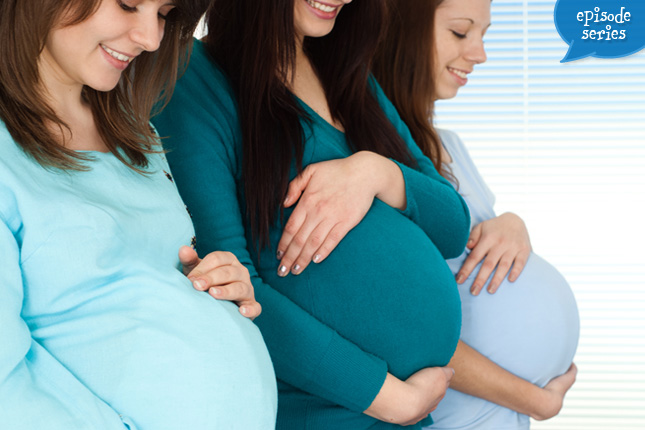Preggie Pals
Childbirth Preparation Methods: Bini Birth
STEPHANIE GLOVER: Bini Birth explores many different methods of childbirth, approaching birth as an individual process that each woman will do in her own way. Classes include different options in breathing positions, labor coping and pain medications. Joining us today is Ana Paula Markel, childbirth educator, doula and founder of Bini Birth. This is Preggie Pals.
[Theme Music/Intro]
STEPHANIE GLOVER: Welcome to Preggie Pals, broadcasting from the birth education center of San Diego. Preggie Pals is you’re online on the go support group for expecting parents and those hoping to become pregnant. I’m your host Stephanie Glover. Thanks to all of our loyal listeners who’ve joined the Preggie Pals club. Our members get special episodes and bonus content after each new show plus special giveaways and discounts. See our website for more information. Another way you can stay connected is by downloading our free Preggie Pals app, available in the Android, iTunes and Windows marketplace. Sunny, our producer is now going to give us some information about our virtual panelist program
SUNNY GAULT: Absolutely, thank you. So, if you guys aren’t here in San Diego where we record Preggie Pals, you could still participate on the show. We have a Facebook page, we also have a Twitter page. And before each episode we like to post questions. We like to get you guys involved in the conversation that we have with each of our episodes. It’s a great way to ask our expert questions. So I’m going to ahead now and post on our Facebook page. In the future, when you guys know that we have a recording, go ahead and check out our Facebook page again, on Twitter as well. You can follow the #preggiepalsvp. The VP stands for “virtual panelist” and that’s a great way to follow the conversation and be part of our shows
STEPHANIE GLOVER: Great. Thank you Sunny
SUNNY GAULT: Sure
STEPHANIE GLOVER: So, Sunny and I are sitting in the studio and we’re just going to introduce ourselves a little bit more as panelists. I’ll go ahead and get started. My name is Stephanie Glover again, I’m thirty-two. I’m the host of Preggie Pals and also a stay-at-home mom. I’m also a trained childbirth educator. I don’t have a due date right now but I have two daughters’ ages three and almost fifteen months. My first is a C-section and my second a VBAC
SUNNY GAULT: And I’m Sunny. And as you guys know I’m producing today’s show. I’m also the owner of New Mommy Media which produces Preggie Pals, Parent Savers, The Boob Group which is our breastfeeding show. And our show for twins and multiples called Twin Talks. And I have four children of my own, I’m crazy like that. And they are ages four and under. So it is a very crazy in my house. I have a four-year-old son, a two-year-old son and identical twin girls who are going to turn one next week, I can’t believe it. Oh my gosh. As far as the birth that I had with all of them, I had, my first son was a vaginal birth and we had some complications. And so, I have to have C-sections after that. So, one vaginal, two C-sections
STEPHANIE GLOVER: Awesome. Thank you
[Theme Music]
SUNNY GAULT: Okay so before we kick off today’s episode, we have an interesting news headline that both Stephanie and I are going to chat about. And we love to have your guy’s feedback on this as well. I’ll go ahead and put the link on our Facebook page so you can see it but it says “Could vitamin D make childbirth less painful?” So this came out not too long ago, a couple of weeks ago and it basically says “low vitamin D levels could make childbirth more painful” so, low levels more pain according to this new study. Vitamin D deficiency is common during pregnancy especially amongst high-risk women, including vegetarians. Those with little sun exposure and members of ethnic minorities say ACOG. So this new study included ninety-three pregnant women whose vitamin D levels were checked prior to childbirth. And they received an epidural for pain during labor. And the researchers measured how much pain medication each of the women requires during delivery. Women with lower vitamin D levels require more pain medication than those with higher vitamin D levels and that’s hence the story that Vitamin D deficiency could make childbirth more painful. So, I don’t know Stephanie what do you think about this?
STEPHANIE GLOVER: I think it’s really intriguing. I’ve heard of associations of the Vitamin D and anxiety and depression. Also like the seasonal effective disorders, if you’re
SUNNY GAULT: Sad
STEPHANIE GLOVER: Living with someone, sad. Sad when it’s gloomy right.
SUNNY GAULT: I know right
STEPHANIE GLOVER: But I could definitely see beyond, there’s a pain theory that’s talked a lot about with childbirth you know if you have fear, if you picture circle, some arrows going around. Fear can lead to tension, can lead to pain, can lead to fear. You know, so, it can be cyclical and if you have a deficiency that’s already making you anxious, depressed or fearful, I could definitely see a correlation
SUNNY GAULT: It’s interesting too because we did an episode on Vitamin D deficiency. So if you guys go to our website www.preggiepals.com or www.newmommymedia.com and you check it out to search for vitamin D, we did a whole episode about this and the benefits and you know, what’s required and all that good stuff. And yeah it, a lot of people don’t even know that they’re vitamin D deficient, you know. I mean, how would you know? I mean
STEPHANIE GLOVER: I probably would never even have asked unless a care provider suggested at though. I have to say I was, maybe six months postpartum and starting to feel a little down and I didn’t know is this postpartum depression kicking in and I’m just really tired. Is it my toddler’s tantrums that are wearing on me? But just, you know, I googled some things, picked up some vitamin D supplements, figured it couldn’t hurt. It certainly helped and, you know, who’s to say that’s a placebo effect or not but it kind of didn’t matter at that point. And I wasn’t too concerned if it was really necessarily a clinical diagnosis, it was just something easy that I could manage and seemed to work for me and so
SUNNY GAULT: Yeah, and I’m all for anything that’s going to reduce pain or surges, whatever you want to call them during labor. Anything that’s going to make that easier especially for those of you who were planning natural, non-medical as far as pain medication’s concerned births. And this maybe something you want to look in to. So it’s really interesting. This article actually came out, let’s see, who release this? Health, so I get it from www.newshealth.com , I’ll include the link on our website if you guys want to check about
STEPHANIE GLOVER: Great
[Theme Music]
STEPHANIE GLOVER: So today we continue our series on childbirth preparation methods. Joining us on the phone today is Ana Paula Markel, founder of Bini Birth. Ana Paula is an ICEA certified childbirth educator, DONA certified doula in a DONA approved birth doula trainer. Welcome to Preggie Pals Ana Paula, thank you so much for joining us today
ANA PAULA MARKEL: Thank you so much for having me. I’m very excited to be part of this wonderful show
STEPHANIE GLOVER: Awesome. So, Bini Birth is spelled B-I-N-I, does that stand for something?
ANA PAULA MARKEL: Yes. Well, the story is that I wanted a name that would reflect not just childbirth in itself but also family. And my grandma was Italian, so, Bini is short for bambini which means children in Italian. But then, we also came up with an acronym that really represents how we teach childbirth education and that is that, birth is individual, it’s also normal and it’s also intimate. And I can elaborate if you want me to
STEPHANIE GLOVER: Well of course, I mean the next thing I was going to ask was for you to describe the principles behind Bini Birth
ANA PAULA MARKEL: Yes and that’s exactly that. You know, birth being individual means no two women birth alike and even the same women for different children for different peer, it’s just like listening to both of your descriptions of your birth, you know, like, we can tell that each experience is completely different. Myself, I’ve had four kids each experience completely different than the other one. So, we do have a tendency to compare with people and that sometimes leads to some downfalls that women may have. Normal because you know childbirth in itself is a physiological process. Childbirth in itself is very simple. The uterus contracts, the cervix will open and you push the baby out. But it’s the culture around birth that is you know, so unique by each city, state, country etc. and definitely intimate and that’s one of the misconceptions that people have about childbirth. The hormones that women and the baby released in labor are very similar to the hormones of breastfeeding and of baby-making and they are quiet, shy hormones that require a certain mood to perform and it’s excellent. So, basically, if we don’t invite many people to watch us make the baby, we shouldn’t invite many people to watch us birth the baby
STEPHANIE GLOVER: It’s funny when you say it because I’ve heard that thing that the way you get the baby in is the same way you get the baby out
SUNNY GAULT: Yeah seriously
ANA PAULA MARKEL: Yeah, that’s [inaudible] and it’s so true and so wise
SUNNY GAULT: So, Ana Paula, what would you say, you know, to the listeners out there trying to determine, you know, they want to do some sort of childbirth preparation, class and they’re trying to figure out what is going to work best for them. So they’re listening to this episode, how would you say that Bini Birth differs from other childbirth preparation methods?
ANA PAULA MARKEL: It’s clearly non-judgemental so we’re going to welcome every pregnant woman regardless of what she comes within her luggage. You know, either a lot of fear, either a lot of excitement, either if she’s planning on a home birth with a midwife or actually she’s planning on unassisted childbirth, we wouldn’t have judgment with that. On the same note, we would also welcome women that plan or are curious or open to an epidural. Or even people that may due need to have a scheduled cesarean birth. We do encourage people to be informed of their decision. So, you know we’ll welcome the men but our job is really to make them feel informed but at the same time supported but, everything, every choice in making life, not just in childbirth. We’ll have you know, it’s upsides and it’s downsides. So that’s really what we explore. You know, risk and benefits of every one of those decisions
STEPHANIE GLOVER: What would you say is needed to be successful at Bini Birth? Would you recommend, mentored doula type of care provider
ANA PAULA MARKEL: Yeah, absolutely informed, you know I think that uninformed, we don’t know our options. We don’t have any options if we don’t know them. So you know what’s available to you and your community, how realistic is, you know, your goals because a lot of times, you know, women think of one thing but doula not. So, there’s making sure everything match. Absolutely doula support, you know we are extremely doula friendly. But at the same time we don’t feel like a place a requirement for a joyful birth experience. And I also feel, you know, what’s really important for us is also joy in your experiences regardless of how they goes. Always find the gifts and the lessons even if things they don’t go as planned. You know, and a lot of celebration of that, you know it’s not process versus outcome which sounds a little bit Tony Robins but you know we can’t control birth, we can’t control parenting but we can always see the value in making the best that we can.
STEPHANIE GLOVER: I remember one of the best pieces of advice I got with my first pregnancy is that there’s joy in the flexibility
ANA PAULA MARKEL: Exactly
STEPHANIE GLOVER: And I remember that really helped me move forward because you can definitely get caught up and in your birth plan and kind of forget that sometimes life has its own plan, so . . .
SUNNY GAULT: Or you could forget your birth plan at home and go to the hospital without it which is what I did with my first vaginal birth. And you really have to be flexible . . .
STEPHANIE GLOVER: Then you roll with the punch.
SUNNY GAULT: Yes
ANA PAULA MARKEL: And that’s exactly what parenting is, and I think that, you know, labour is a really good appetizer for the main dish which is parenting. You know, you do learn flexibility, you do learn humbleness, you do learn sense of humor. You learn to rely on people that love you and you learn to advocate for yourself. You know, those are all required components of parenting. So, you know it’s really important to not be so attached to one particular outcome but to see the process, the big picture. So our childbirth requires is way more than a childbirth life it’s really about the transformation that people are going to in that time of their lives. So they learn how to communicate with each other as partners, they learn how to communicate with their care providers.
They learn to listen to their intuition which is also very important you know, there is science in communication as well.
STEPHANIE GLOVER: Definitely. And what are some effective ways to actually learn the Bini Birth principle. You know, which of the classes, are there any other resources for your program?
ANA PAULA MARKEL: Yes. We decide the class that we offer tons of support groups and a lot of free options for people just to come in and come out. You know one of the things that we say that Bini is a place that you don’t have to come to buy anything or to take a class. You can really just come to hang out or to have somebody else hold your baby if you are, you know, in an overwhelmed moment. It’s the support goes way beyond after the birth. I come from another country, I’m originally Brazilian and I moved here to grow my family and really had no resources, and had really figured it out for my own. That was really isolating and very, very challenging. So, Bini is the vision that I, what I wish I would have had. You know just a space for pregnant women, partners and new parents to get together. You know, and we may not have all the answers but together we can get there a little quicker or with more acceptance or with more laughter or has witnessed two shoulders when we cry. And, you know those kind of corny cheesy aspects of you know pregnancy and parenting but that we do need to shock up in to it in order to shift and change and all of that.
STEPHANIE GLOVER: Awesome. When we come back, we’ll discuss what to expect from a Bini Birth class. We’ll be right back
[Theme Music/Intro]
STEPHANIE GLOVER: Welcome back. We’re continuing our series on childbirth preparation methods and we’re learning all about Bini Birth today from our expert Ana Paula Markel. So let’s talk about the classes. At what point in their pregnancy should women take these classes?
ANA PAULA MARKEL: Well most people take childbirth classes in their second trimester but we certainly have those guys that [inaudible] can be want to come because they want to know, you know, what the seasons to make and how to better prepare and we always have the procrastinators that come in the last minute as well. Because of that we do offer different formats of class. We have longer versions or shorter versions if people come later in the game
STEPHANIE GLOVER: And so what, what are the differences in length, what’s the long version versus a short version?
ANA PAULA MARKEL: Well the classes in average go from twelve hours to eighteen hours of total amount of class it’s just really the time zone which format. The topics, the curriculum are the same it’s just that on the longer versions we have more time for discussions and debates and insights. And on the shorter version which is really more about, you know the information in a little bit of a faster page.
STEPHANIE GLOVER: So would it be like a, a one day or two day class versus several weeks?
ANA PAULA MARKEL: Exactly
STEPHANIE GLOVER: Okay. And what do you learn in a class that you would say would, that you wouldn’t learn maybe in other ways?
ANA PAULA MARKEL: Oh absolutely! So, you know, you obviously will learn like all the basic of childbirth in classes. You know the process of labour, how does it start, how do you know it’s progressing. But then we also work a lot on communication skills not only with your partner but also with your team. We talk a lot about, you know the difference in between theory and field practice. So you know like how does it look like in the book and how does it may look like in real life. So, not only for labour but also in parenting. So there is a lot about, it’s a combination of scientific evidence and intuitive knowledge you know. So this is what science tell us, this is what the numbers tell us, but this is how it may look like in real life and these are couple other ways that you can deal about it. Another important element of this process is connection. You know connection with yourself, connection with your baby, connection with your partner and owning it. You know, really own your choices. There is no shame in choosing an epidural, there’s no shame in choosing a home birth. There is you know, once you make that inform this fusion you own and then you celebrate. Anything go a little differently, you own that too. You know it’s your responsibility to be a parent, you know, so that comes with birth as well
STEPHANIE GLOVER: Walk us through a typical class if you would. So what would we expect when we join you and sit down and what would our time look like?
ANA PAULA MARKEL: So the first thing you would expect is a gorgeous phase. It’s really important for her that people come in and that the environment really does the experience for them. You know the news is everything in labor and that’s really important for us in childbirth classes too. So, they are really welcomed by a very comfortable and warm space. The second element is food, we always offer wonderful, delicious food that is high quality and served in beautiful bowls. It’s really an excitement in preparing for these people to come in the door and you know expect them as if we were expecting for a party. Then we always start with a check-in, you know, where are they coming from? Where are they at what’s going on with them at that day, since there may be in their mind. So, you know, it’s a student-driven class. So, even if we may have prepared offline and we may address topics that we planned for, it’s because there’s more, you know, in a worried mood or you know, we will go where they need to be. Then we have a lecture part of the class. And then we have a practice part of the class. So, there is, you know, that’s the theory in practice component to it. So, for instance if we’re going to talk about, you know, coping labor, you may have a lecture about what works from those people in different stages of labor. I have a PowerPoint presentation with some photos of it. And then the second part of it is let’s try it. And then, you communicate with your partner. Does this work for you? Do you see yourself using this labor, why did you like the one thing more than the other one? So that’s more or less what we would be and then in the end, there is you know a closing to it with what’s the moral of the story of the day
STEPHANIE GLOVER: Great. And what would you say to a woman who’s considering this childbirth method?
ANA PAULA MARKEL: Welcome and get ready to have fun and learn a lot. And you know it is a process. And for a lot of people that comes with this information. You know a lot of times we witness people tapping into you know their childhood experience is all you know what kind of parents they want to be. So it can be profound for some people. It can also be very practical for some people it really depends on you know, what they want to take from it
STEPHANIE GLOVER: What additional resources would you recommend for more information?
ANA PAULA MARKEL: I definitely would recommend that they check Dona International for birth doulas so www.dona.org and birth by the numbers, I think that’s really important for them to understand you know where we are as a nation in childbirth. And then impact how they make their decisions. Of course, the business of being born and more business of being born if they enjoy these sorts of thing and birth story the documentary about anatomy and the four midwives
STEPHANIE GLOVER: I know personally the business of being born I think changed my, yeah, my whole like thought for us on labor so, I can definitely attest to that
ANA PAULA MARKEL: Yeah. I mean it’s incredible what it has done to the entire, you know, the industry of childbirth. You know, every time I teach a class I ask the couple how many people here have watched the business of being born. And it’s usually you know ninety-five percent of the class. And that’s what makes that really pay attention that they have to do some work, you know before they can relax which is again their responsibility. And you know, choosing their care is really, really the main thing that they can do for themselves.
SUNNY GAULT: Ana Paula, I know you’re located in the Los Angeles area, but if people are listening, you know, we have listeners from all over the place. Are there classes that are offered across the country or is it pretty much right now just in the LA area?
ANA PAULA MARKEL: Right now it’s just on the LA area although I have traveled to teach classes to other locations. And we do now have five other educators that could potentially travel. Were also looking into having classes online but it’s a very complicated process as you both probably know more than me. You know, so it is a process for us to, but we do, I personally do a lot of phone consultation or skype consultations if people wants to develop, you know a plan or just wants to process the class first, we offer all of those services
SUNNY GAULT: Okay. And they can reach out to you through the website, what is the website?
ANA PAULA MARKEL: The website is www.binibirth.com B-I-N-I birth, B-I-R-T-H dot com. And they can reach me at anapaula@binibirth.com
STEPHANIE GLOVER: Great. Well, thanks Ana Paula for joining us today. For more information about Ana Paula Markel, as well as information about our panelist, visit the episode page on our website. This conversation continues for members of our Preggie Pals club. After the show, Ana Paula is going to provide tips on choosing a childbirth preparation method that’s right for you. To join our club, visit our website www.newmommymedia.com
[Theme Music]
ANNIE LAIRD: We have a question for one of our experts. Amy in Orlando writes: I hate working out. My midwife says that I need to exercise. I haven’t exercised in years. What should I start doing?
LEIGN–ANN WEBSTER: Hi this is Leigh-Ann Webster with 52 healthy weeks. I wanted to get back to you Amy about your recent question. I definitely agree with your midwife you should absolutely be doing some form of exercise during your pregnancy. But because you haven’t worked out in years, what I would suggest is something that you’re little weight-bearing. So I would do if I were you is either begin walking thirty minutes a day or swimming thirty minutes a day. Once you get your endurance back up, so I would say after two to three weeks of this type of movement. Any way you want to start incorporating heels if you’re walking or some faster swimming if you’re getting in the pool. In addition to that as you just said you start doing some very low weights high repetitions particularly with your arms so maybe fifteen, three sets of fifteen bicep curls using five to ten pound weights depending on how strong you are and some tricep extensions as well. And if you have trouble figuring out exactly what I mean by that, if you Google those on YouTube you’ll find plenty of great examples. I hope that your pregnancy goes well and thank you so much for asking the question. Have a great day
[Theme Music/Intro]
STEPHANIE GLOVER: That wraps up our show for today. We appreciate you listening to Preggie Pals.
Don’t forget to check out our sister shows
• Parent Savers for parents with new born, infants and toddlers
• Twin Talks for parents of multiples
• Our show The Boob Group for moms who breastfeed their babies
This Preggie Pals; “Your Pregnancy Your Way”
[Disclaimer]
This has been a New Mommy Media production. Information and material contained in this episode are presented for educational purposes only. Statements and opinions expressed in this episode are not necessarily those of New Mommy Media and should not be considered facts. Though information in which areas are related to be accurate, it is not intended to replace or substitute for professional, Medical or advisor care and should not be used for diagnosing or treating health care problem or disease or prescribing any medications. If you have questions or concerns regarding your physical or mental health or the health of your baby, please seek assistance from a qualified health care provider.
SUNNY GAULT: New Mommy Media is expanding our lineup of shows for new and expecting parents. If you have an idea for a new series or if you’re a business or organization interested in joining our network of shows through a co-branded podcast, visit www.NewMommyMedia.com .
[00:24:32]
[End of Audio]












